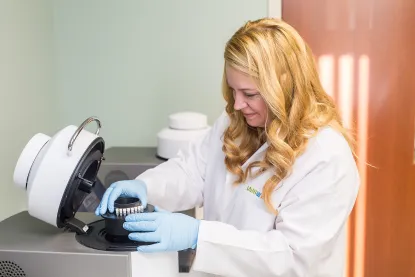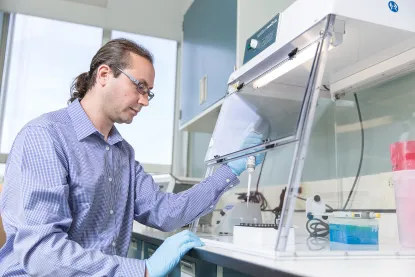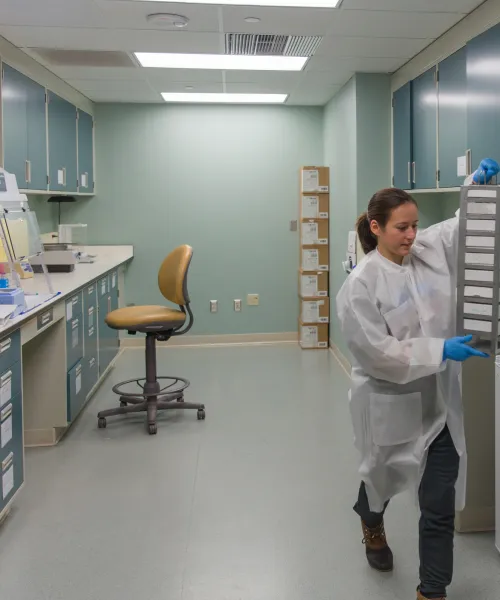
Program Overview
Clinical molecular diagnostics is the future of the healthcare industry. Molecular tests are utilized with increasing frequency in areas of medicine including genetic disorders, infectious diseases, detection and monitoring of cancer, pharmacogenomics, and identity testing.
Northern’s Master of Science degree in Clinical Molecular Diagnostics (CMD) program provides a rigorous graduate-level education for clinical laboratory scientists and biologists in the field of molecular diagnostics. Graduates from this program will gain expertise in the clinical applications of molecular genetic tests for acquired, inherited, and infectious diseases.
This program is for laboratory science professionals who are already trained and competent in a medical laboratory or related discipline.

Program Format
The CMD program provides flexibility for working professionals while also being suited for students interested in performing research at NMU. The CMD program consists of:
- Interactive web-based courses
- A week-long on-campus laboratory experience (required for thesis only)
- A flexible curriculum design that allows for distance or on-campus degree completion
Students have the option to select between an infectious disease or human genetics concentration.
"Faculty of the CMG program are extremely invested in the success of their graduate students and provide many opportunities in an encouraging environment for the development of critical thinking and problem-solving skills. The education received in this program prepares students like myself to pursue many avenues such as clinical or academic leadership roles and/or continuing onto other academic programs."
- Casey Juntila, CMG Thesis Student
Flexible, rigorous curriculum
The web-based courses allow students greater flexibility in learning but are no less rigorous than traditional classroom-based courses. Initial courses provide the groundwork knowledge while subsequent courses develop the student’s ability to critically apply that knowledge and establish the foundation for a successful thesis or capstone project.
Hands-on research opportunities
The CMG program provides research opportunities for individuals who are interested in performing thesis work. The opportunities include research projects dedicated to the development of assays for detection of human pathogens, development of an assay for mutational evaluation of glioblastoma and research for a fundamental understanding of glioblastoma.
Facilities and equipment
Northern's CMG laboratory consists of approximately 3,500 square feet of space. Lab projects include the development of assays for the detection of human pathogens as well as the development of an assay for mutational evaluation of glioblastoma. We have recently combined laboratory resources with the Upper Michigan Brain Tumor Center (UMBTC) whose mission includes research into developing a fundamental understanding of glioblastoma and human cancers.
Program Curriculum
The Master of Science in Clinical Molecular Genetics (CMG) is offered to those interested in professional opportunities in clinical molecular diagnostics for healthcare, biotechnology, pharmaceuticals, forensics, research and academe. Track 1 provides the student with an option to focus on Human Genetics or Infectious Disease applications within the clinical laboratory. Degree completion can be attained through an on-campus research thesis in Clinical Molecular Genetics, a project in Clinical Molecular Genetics, or a capstone in Clinical Applications of Genetic & Genomic Technologies.
Track 1: Clinical Molecular Diagnostics - Human Genetics Concentration
Within the chosen concentration, students choose between two non-thesis options or a thesis option. A total of 4 credits of CLS 580 (Project) or CLS 590 (Capstone) or CLS 599 (Thesis) are required for the degree.
| Semester 1 (Fall) - 6 Credits | ||
| CLS 520 | Principle of Clinical Molecular Genetics | 3 |
| CLS 563 | Research Design and Methods | 3 |
| Semester 2 (Winter) - 8 Credits | ||
| AIS 535 | Using Scholarly Library Resources in Support of Grad Research | 2 |
| CLS 526 | Clinical Molecular Diagnostic Techniques | 3 |
| CLS 536 | Clinical Genetics | 3 |
| Semester 3 (Spring/Summer) - 5-6 Credits | ||
| CLS 516* | Clinical Molecular Diagnostic Laboratory (Thesis Only) | 1 |
| CLS 538 | Molecular Identification of Somatic Mutations in Cancer | 3 |
| CLS 543 | Molecular Diagnostic in identity Testing | 2 |
| Semester 4 (Fall) - 7 Credits | ||
| CLS 541 | Clinical App of Genomic Medicine | 3 |
| CLS 570 | Method Verification and Validation | 4 |
| Semester 5 (Winter) - 7 Credits | ||
| CLS 560 | Biomedical Lab Operations | 3 |
| CLS 580 | Project in Molecular Genetics (1-4 cr) | 4 |
| OR 590 | OR Capstone in Clinical Applications of Genetic & Genomic Technologies (1-4 cr) | |
| OR 599 | OR Thesis in Clinical Molecular Genetics (1-4 cr) | |
| TOTAL CREDITS REQUIRED FOR DEGREE: 33-34 | ||
*CLS 516 is a 1-week on-campus laboratory course. It is required for students who plan to perform a campus- based laboratory research and thesis.
Track 1: Clinical Molecular Diagnostics - Infectious Disease Concentration
Within the chosen concentration, students choose between two non-thesis options or a thesis option. A total of 4 credits of CLS 580 (Project) or CLS 590 (Capstone) or CLS 599 (Thesis) are required for the degree.
| Infectious Disease Concentration – Project or Capstone or Thesis Option | ||
| Semester 1 (Fall) - 6 Credits | ||
| CLS 520 | Principle of Clinical Molecular Genetics | 3 |
| CLS 563 | Research Design and Methods | 3 |
| Semester 2 (Winter) - 8 Credits | ||
| AIS 535 | Using Scholarly Library Resources in Support of Grad Research | 2 |
| CLS 526 | Clinical Molecular Diagnostic Techniques | 3 |
| CLS 545 | Molecular Identification of Viral and Fungal Pathogens | 3 |
| Semester 3 (Spring/Summer) - 5-6 Credits | ||
| CLS 516* | Clinical Molecular Diagnostic Laboratory (Thesis Only) | 1 |
| CLS 543 | Molecular Diagnostic in identity Testing | 2 |
| CLS 544 | Molecular Identification of Bacterial Pathogens | 3 |
| Semester 4 (Fall) - 7 Credits | ||
| CLS 541 | Clinical App of Genomic Medicine | 3 |
| CLS 570 | Method Verification and Validation | 4 |
| Semester 5 (Winter) - 7 Credits | ||
| CLS 560 | Biomedical Lab Operations | 3 |
| CLS 580 | Project in Molecular Genetics (1-4 cr) | 4 |
| OR 590 | OR Capstone in Clinical Applications of Genetic & Genomic Technologies (1-4 cr) | |
| OR 599 | OR Thesis in Clinical Molecular Genetics (1-4 cr) | |
| TOTAL CREDITS REQUIRED FOR DEGREE: 33-34 | ||
*CLS 516 is a 1-week on-campus laboratory course. It is required for students who plan to perform a campus-based laboratory research and thesis.
Track 2: Clinical Molecular Laboratory Education
| Semester 1 (Fall) - 3 Credits | ||
| CLS 520 | Principle of Clinical Molecular Genetics | 3 |
| Semester 2 (Winter) - 8 Credits | ||
| CLS 526 | Clinical Molecular Diagnostic Techniques | 3 |
| CLS 536 | Clinical Genetics | 3 |
| ED 505 | Measurement and Evaluation | 2 |
| Semester 3 (Spring/Summer) - 5 Credits | ||
| ED 504 | Psychology of Evaluation | 2 |
| CLS 544 | Molecular Identification of Bacterial Pathogens | 3 |
| Semester 4 (Fall) - 7 Credits | ||
| CLS 541 | Clinical App of Genomic Medicine | 3 |
| CLS 570 | Method Verification and Validation | 4 |
| Semester 5 (Winter) - 7-10 Credits | ||
| CLS 560 | Biomedical Lab Operations | 3 |
| ED 522 | Curriculum Development | 3 |
| CLS 580 | Project in Clinical Molecular Genetics | 1-4 |
| TOTAL CREDITS REQUIRED FOR DEGREE: 33 | ||
Admission requirements
Applicants are required to comply with the regular admission requirements of the Office of Graduate Education and Research, which includes an undergraduate grade point average of 3.0. In addition, students must have a bachelor’s degree in Clinical Laboratory Science or related science. Transcripts of applicants will be evaluated on an individual basis.
Applicants should also have,
- Coursework in genetics, hematology, microbiology, immunology, molecular biology, chemistry, and statistics.
- Laboratory experience. This can be met by documented clinical laboratory experience or 16 credits of coursework accompanied by a lab. Students may be admitted with deficient backgrounds if coursework is met in a defined period of time.
- Three letters of recommendation from instructors or professional references. Letters should address the applicant’s academic and professional abilities and preparation for graduate study.
- A statement of intent must be included which describes the applicant’s laboratory skills and experiences, and reasons for pursuing graduate education.
Note: In cases where the undergraduate GPA is below 3.0, additional factors, including clinical laboratory experience/molecular laboratory experience or performance in the last 60 hours of course work, may be weighted more heavily in the assessment for admissions.
Program Contact Information
School of Clinical Sciences
Clinical Molecular Genetics
West Science Facility
Matthew Jennings, Assistant Professor
906-227-1661
majennin@nmu.edu
